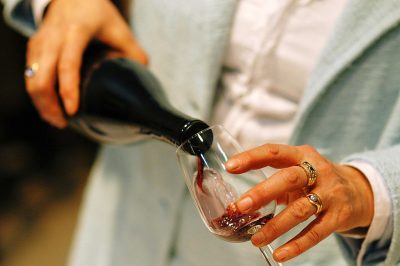Going out to eat is a universally social, simple and satisfying activity for many. But that doesn’t mean it’s equal.

Boston University’s Diversity and Inclusion Office’s Learn More Series partnered with the Metropolitan College Gastronomy Program to launch “The Curse of Connoisseurship” — a series about social class and the beverage industry — Thursday.
The Diversity and Inclusion Office, which aims to fortify BU’s commitment to prioritizing inclusion, chose “social class” as the overarching theme for their annual Learn More Series.
The conference sessions throughout the series provide a platform for discussion about the many aspects of the wine and spirits industry and how they are affected by rhetoric, events, language and spaces.
The main Learn More Series, which spans the 2020-2021 year, features five nationally renowned speakers tackling the roots and development of social class.
Alana Anderson, the director of programs at the Diversity and Inclusion Office, said partnering with the gastronomy program keeps the topic “BU-centric” while exploring the topic of social class in a contextualized setting for students.
“The goal of this series is to help build understanding capacity about a single topic of social importance,” Anderson said, “but also how we turn the theoretical understanding of a topic into action in terms of changed behavior, changed culture, changed climate, specifically at BU.”
Jared Sadoian, a Massachusetts Institute of Technology graduate who is the general manager of Craigie on Main in Cambridge — a French New American food restaurant — gave a talk Tuesday titled “Crafting the Back Bar: Capitalism vs. Classism.”
In an interview, Sadoian, who was also the former general manager of The Hawthorne bar in Kenmore, said certain populations can be targeted by seemingly small choices made at a restaurant, such as dress codes.
He said at The Hawthorne, despite the “fancy” feel, they made steps to be inclusive.
“We treated it with a certain sense of irreverence and made sure that everyone was walking through our doors,” he said. “Due to our location we had a very wide cross section of humanity coming through the bar, we made sure that everyone felt like they belonged.”
He said making communal places such as restaurants inclusive is important because they are reflective of the societal benefits of diversity.
“These are spaces where we congregate with other people, whether they be our friends or family and whatnot,” he said. “A restaurant as a microcosm of the greater society benefits from having diversity of race, diversity of income level.”
Anderson said the series is designed to help BU students grow and learn about diversity within the BU community, so they can learn about different experiences and develop multi-angle perspectives.
She said the inaugural Learn More Series of lectures began in 2019 and focused around race. Next year, the topic will be disability, she said.
“The more that we can engage in learning about different experiences, and recognizing that the more diversity that we have, the more responsibility that we have to learn about people’s experiences, and not do any of our work from a one-size-fits-all perspective,” Anderson said. “I think better we create a community that is robust where people can feel like they can be their authentic selves.”
“The Curse of Connoisseurship” events will continue each Tuesday and Thursday until March 18, covering topics from diversity in hospitality to creating welcoming spaces in restaurants.
Kristen Handricken, the director of learning and training within the Diversity and Inclusion Office, said she is looking forward to the future of the Learn More Series, especially as it continues to expand.
“The Learn More series as a program is a wonderful opportunity for the local colleges and schools to sort of spin off of it and do their own work,” she said. “I think it’s growing.”














